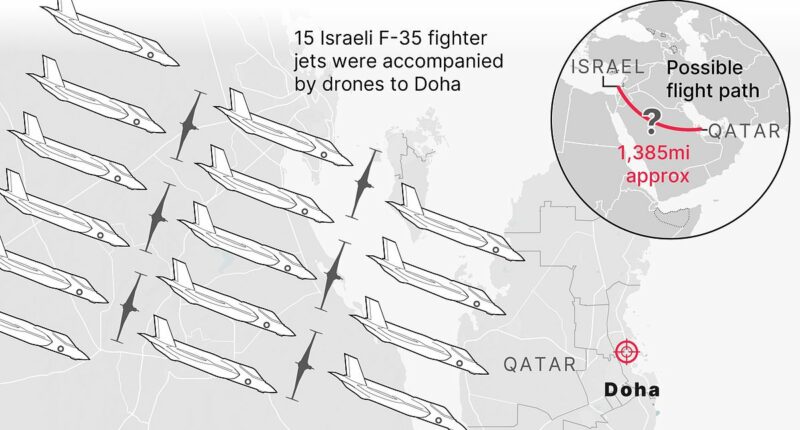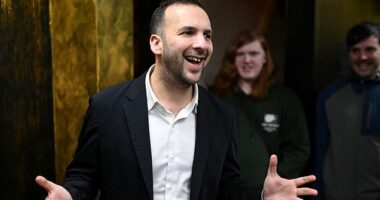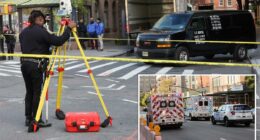Share this @internewscast.com

In a significant escalation of the war in the Middle East, Israel carried out an unprecedented strike on senior Hamas leaders in Qatar ‘s capital, Doha, on Tuesday afternoon. Qatar immediately condemned the ‘reckless Israeli behaviour’, accusing the country of launching a ‘cowardly criminal assault’ and of violating international law. The bold airstrike involved some 15 Israeli Air Force fighter jets dropping over 10 munitions on a residential building that had been identified as a regular meeting place for Hamas leadership.

Israel is said to be ‘increasingly optimistic’ about the results of the attack, codenamed Summit of Fire, but the terrorist group said the strike had failed to wipe out senior officials in the group’s negotiating team. It did, however, kill six others. According to Hamas, those killed include Humam Al-Hayya, the son of chief negotiator al-Hayya; Jihad Labad, the director of al-Hayya’s office; Abdullah Abdul Wahid; Moamen Hassouna; Ahmed Al-Mamluk and corporal Badr Saad Mohammed Al-Humaidi from the Qatari internal security forces.

The surprise attack was aiming for senior Hamas officials reportedly meeting in Doha to discuss U.S. President Trump’s deal for ending the war, which called for the terrorist group to immediately release the remaining 48 Israeli hostages – of whom 20 are believed to be alive – and a temporary ceasefire. Justifying the attack, the Israel Defence Forces claimed to have targeted officials ‘directly responsible for the brutal October 7 massacre’. A Hamas statement said: ‘We confirm the enemy’s failure to assassinate our brothers in the negotiating delegation.’ It added that the attack ‘confirms beyond doubt that Netanyahu and his government do not want to reach any agreement’ for peace.
How did the attack happen?

According to Israeli officials, the strike was months in the making but planning accelerated in recent weeks. It was a wholly independent Israeli operation, according to a statement from the Israeli prime minister’s office. ‘Israel initiated it, Israel conducted it, and Israel takes full responsibility.’ The IDF said measures were taken to mitigate harm to civilians, including the use of ‘precise munitions’ and ‘additional intelligence’. Qatar has a significant arsenal of air defence systems, including the U.S.-made Patriot and Terminal High-Altitude Area Defense (THAAD) batteries. But the country said the Israeli weapons ‘were not detected by radar’.

This indicates that the Israeli fighter jets could have launched so-called ‘stand-off’ missiles from a distance, without entering Qatari airspace. The first explosions were heard in the Qatari capital of Doha soon after 4 pm local time in the upscale residential area of the West Bay Lagoon, near schools, universities and foreign embassies. Black plumes of smoke were seen coming out of a heavily damaged complex next to Woqod petrol station, on Wadi Rawdan Street, west of Katara beach. Close to Doha’s central business district, the West Bay Lagoon area is under high security, leading some experts to believe that Israel must have struck at a distance.

The attack involved some 15 fighter jets – that required mid-air refueling – dropping 10 munitions on a single target. Drones also took part in the operation, according to Ynet. According to Ahmed Hashim, professor of war studies at Deakin University , it was probable that Israel used its modified Adir version of the US F-35 fighter jets, alongside customised F-15I Ra’ams for ‘air cover’. The missiles can be fitted with fuel tanks, allowing them to fly about 2,200km, but they do not need to be flown all the way to a target to strike. ‘The missiles would do the job from a stand-off distance,’ Hashim told ABC.

‘I don’t think the planes were over the Doha district. They struck from a distance with precision. And I think they were guided there by intelligence provided by ground.’ Following the explosion, the buildings that had housed the Hamas leadership could be seen still standing. But one room in particular appeared to have been the target of the strike – its walls were collapsed, and gray rubble could be seen inside. A petrol station to the side of the building did not appear to have suffered any fire damage. The windows of the building next to the one targeted remained intact, suggesting that whatever munitions the Israeli military used was a low yield weapon designed only to hit the building they suspected the Hamas leaders were meeting in.

Israeli Prime Minister Benjamin Netanyahu said the building was the exact location where Hamas leaders had celebrated on October 7, 2023, while the terrorist group were carrying out the massacre that killed about 1,200 people and saw another 251 taken hostage. Speaking at a U.S. Embassy event in Jerusalem hours later, Netanyahu said that ‘the days are over when terror leaders will enjoy immunity in a particular place,’ referring to how the tiny Gulf emirate has long been a haven for Hamas officials to live in luxury. In the lead-up to the attack, senior officials from the Shin Bet security service, military intelligence and operations directorate convened once a week.

On Monday night, general Itzik Cohen, head of the operations directorate, finally gave the green light ahead of the attack. The operation was apparently concealed from Israel’s broader cabinet because of its sensitivity – in part due to Doha’s proximity to the Iranian air defense systems. IDF Chief of Staff Eyal Zamir and Air Force Commander Tomer Bar personally directed operations, which were run from the Shin Bet’s special command centre in Israel. Netanyahu, defense minister Israel Katz, the acting Shin Bet chief known only as ‘M.,’ his deputy, and the head of military intelligence were all reportedly present in the war room.

The fates of the senior Hamas officials who Israel were targeting are still unclear. But Israel confirmed that it was aiming for al-Hayya, the head of Hamas’s negotiating team. Other senior figures understood to be in Qatar include Khaled Mashal, head of the group’s political bureau abroad; Zaher Jabarin; Mohammad Ismail Darwish, Mousa Abu Marzook; Hussam Badran; Taher al-Nunu and Nizar Awadallah. A Qatari Foreign Ministry spokesman, Majed al-Ansari, condemned the strikes: ‘This criminal assault constitutes a blatant violation of all international laws and norms, and poses a serious threat to the security and safety of Qataris and residents in Qatar.’
The significance of timing

Even though the attack was apparently months in the making, Netanyahu and Katz confirmed that the strike was in response to Monday’s deadly terror shooting at a bus stop in Jerusalem. Six people were killed, including a pregnant woman, and eight others were wounded by the Palestinian gunman. He opened fire at a bus stop at Ramot Junction on Yigal Yadin Street, in the city’s northern outskirts. Hamas praised two Palestinian ‘resistance fighters’ and hailed the attack, with the group’s armed wing, the al-Qassam Brigades, later taking responsibility. Speaking at the U.S. Embassy after the Doha attack, Netanyahu said: ‘Yesterday, four of our soldiers were killed by Hamas terrorists in Gaza and six Israeli civilians were brutally murdered at a bus stop in Jerusalem.

‘This morning, Hamas proudly took credit for both of these actions. At noon today, I convened the heads of Israel’s security organizations and authorised a surgical precision strike on the terrorist chiefs of Hamas.’ Last month, IDF chief of staff Zamir threatened Hamas leaders residing abroad. After the killing of the group’s spokesperson, Abu Obeida, in an aerial attack in Gaza City in August, Zamir said: ‘Most of Hamas’ leadership has been eliminated, and we are not finished. Most of Hamas’ remaining rule sits abroad – and we will reach them too.’
Was the U.S. involved?

In a post on Truth Social, Trump made it clear that the attack was the result of a ‘decision made by Prime Minister Netanyahu, it was not a decision made by me’. However, the U.S. president said his administration was ‘notified’ by the U.S. military in the morning that Israel was planning an attack on Hamas. He added that it was unfortunate the strikes were aimed at Doha. ‘Unilaterally bombing inside Qatar, a Sovereign Nation and close Ally of the United States, that is working very hard and bravely taking risks with us to broker Peace, does not advance Israel or America’s goals,’ the U.S. president said. But he caveated his criticisms of Israel, noting that ‘eliminating Hamas, who have profited off the misery of those living in Gaza, is a worthy goal’.

Trump said he immediately alerted special envoy Steve Witkoff about the impending strikes and told him to ‘inform the Qataris’, but said Witkoff delivered the news ‘too late to stop the attack’. The Qatari foreign ministry spokesman al-Ansari said the country had not received a U.S. warning ahead of the strike. ‘The statements being circulated about Qatar being informed of the attack in advance are baseless,’ he said. ‘The call from a U.S. official came during the sound of explosions caused by the Israeli attack in Doha.’

Prime Minister Sheikh Mohammed bin Abdulrahman al Thani said ‘the Americans sent a message 10 minutes after the attacks took place, saying they were informed that there was going to be a missile attack on the state of Qatar’. On Truth Social, Trump continued: ‘I view Qatar as a strong Ally and friend of the U.S., and feel very badly about the location of the attack. I want ALL of the Hostages, and bodies of the dead, released, and this War to END, NOW! ‘I also spoke to the Emir and Prime Minister of Qatar, and thanked them for their support and friendship to our Country. I assured them that such a thing will not happen again on their soil. I have directed Secretary of State, Marco Rubio, to finalise the Defense Cooperation Agreement with Qatar.’
Why is the attack controversial?

The strike risks escalating tensions in the Middle East, with Doha’s neighbours in the UAE and Saudi Arabia denouncing Israel in the wake of the attack. Though Qatar has long harboured Hamas officials and maintains close ties with Iran, it is also a strong U.S. ally and thousands of American soldiers are stationed at its Al Udeid Air Base. Doha is also the primary location for ceasefire negotiations and Qatari officials have been essential mediators in tense negotiations between Israel and Hamas. It has hosted Hamas’ political bureau since 2012. While Netanyahu has said the attack means the war in Gaza can now end ‘immediately’ and has urged Gazans to ‘accept President Trump’s proposal’, Qatar has said the Israeli strikes have only harmed the peace process.

The emir of Qatar, Sheikh Tamim bin Hamad Al Thani, and Prime Minister Sheikh Mohammed reportedly spoke with Trump during a phone call shortly after the Israeli strike, saying that the attack had only harmed attempts at reaching a deal. Several other nations have condemned Israel. Sir Keir Starmer said the strikes ‘ violate Qatar’s sovereignty and risk further escalation across the region’, while Trump said he was ‘not thrilled about the whole situation’. A statement from the Qatari foreign ministry said: ‘While the State of Qatar strongly condemns this assault, it confirms that it will not tolerate this reckless Israeli behaviour and the ongoing disruption of regional security, nor any act that targets its security and sovereignty.’

Muhammad bin Salman, the Saudi crown prince, called the attack a ‘criminal attack’, while Anwar Gargash, a diplomatic adviser to the president of the UAE, condemned the strike as ‘treacherous’. The UAE is the Jewish state’s strongest ally in the region and was the first Gulf country to normalise relations with Israel in September 2020 through the Abraham Accords. The UN joined in denouncing the attack, warning that upending the negotiation process threatened to collapse ongoing ceasefire talks.

Secretary-General Antonio Guterres on Tuesday said Israel’s strikes were a ‘flagrant violation of the sovereignty and territorial integrity of Qatar’. On Tuesday evening, the Iran-backed Houthis launched a ballistic missile attack on Israel, claiming to have targeted ‘several sensitive targets’ in the Jerusalem area using a projectile with a cluster bomb warhead. The Israeli military successfully intercepted the missile and there were no reports of injuries or damage.
What happens next?

Speaking later on Tuesday in Jerusalem, Netanyahu said Israel’s attack opened the door to the end of the war in Gaza. He said Israel had accepted the U.S. president’s proposal – beginning with the immediate release of all Israeli hostages still held in Gaza – and urged the Palestinians to accept it too. ‘Don’t be derailed by these murderous terrorists, by these killers,’ he said, directing his words to the people of Gaza. ‘Make peace with us, and accept President Trump’s proposal. Don’t worry, you can do it, and we can promise you a different future. But you’ve got to take these people out of the way. If you do, there is no limit to our common future.’

But according to Dr Andreas Krieg, Associate Professor of Defence Studies at King’s College, Israel’s attack in Doha was not about securing peace, but about ‘crippling’ negotiations for a ceasefire. ‘By hitting the very meeting where a U.S.-backed ceasefire proposal was being discussed, Netanyahu undermined the American-led diplomatic track,’ Krieg told the Daily Mail. ‘It was a way of forcing Washington’s hand, putting Israel’s maximalist position above U.S. mediation. In doing so, he signalled to both Hamas and the White House that Israel will not be bound by negotiations it sees as premature or constraining.’ But Netanyahu’s plan could end up backfiring.

‘The Hamas delegation survived, which elevates their stature and strengthens the resistance narrative,’ Krieg said. ‘Regionally, Israel has managed to isolate itself further, angering not just Qatar but also Saudi Arabia, the UAE and others who see this as a violation of Gulf sovereignty. Internationally, the strike looks less like strategic foresight and more like Netanyahu ploughing the diplomatic field just to prove he can.’ Meanwhile, Israel appears to be pushing ahead with its planned military takeover of Gaza City – the Strip’s most populous region where roughly half of Gaza’s 2.1 million residents have been taking shelter.

On Tuesday, Israel issued an evacuation order for the entirety of the capital for the first time during the current round of fighting, urging residents to transfer to Al-Mawasi in southern Gaza. Despite several warnings for civilians to flee, only about 50,000 people are understood to have left Gaza City. Leading humanitarian groups have warned that the IDF’s plan to takeover Gaza City would prove catastrophic to the civilian population. United Nations Secretary-General Antonio Guterres warned of ‘the massive death and destruction that a military operation against Gaza City would inevitably cause’.

‘The intensification of hostilities in Gaza means more killing, more displacement, more destruction and more panic,’ Christian Cardon, the chief spokesperson for the International Committee of the Red Cross (ICRC), said. Israel launched a military campaign in Gaza after the Hamas-led attack on October 7 in which about 1,200 people were killed and 251 more were taken hostage. At least 64,231 people have been killed in Israeli attacks in the war in Gaza since then, according to the territory’s Hamas-run health ministry.






